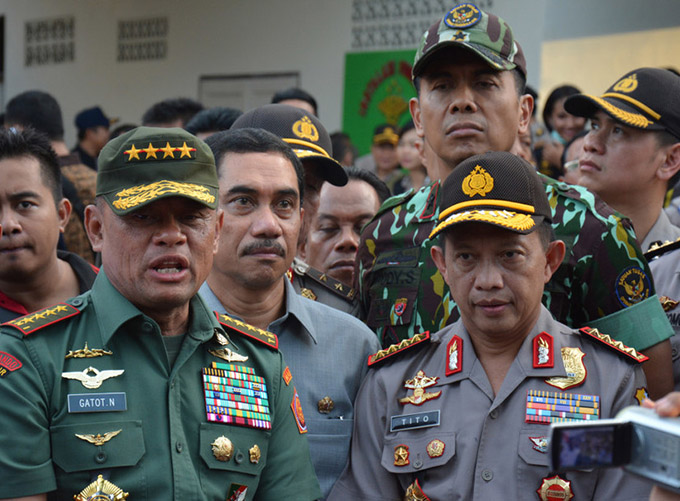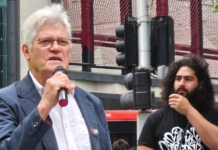
ANALYSIS: By Johannes Nugroho (Part 2)
Following the awkward debacle of suspended military cooperation with Australia, in another maverick moment, General Gatot Nurmantyo told the press he might soon be replaced as chief of the Indonesian Military (TNI), hinting that he had somehow fallen out of favour — but later explaining that at any rate, he was nearing retirement.
He then made an “exposé” about how little power the TNI chief had in the procurement of military hardware under a 2015 law that grants the Ministry of Defence sole responsibility for such acquisitions.
Ruing his loss of control over procurement, he said: “If this [erosion of the TNI chief’s prerogatives] continues, then the commander will have no authority whatsoever.”
The new law must have come as a great disappointment to the armed forces, just when they were expecting significant rises in defence spending.
In the 2017 state budget, defence is one of the 10 biggest spenders at Rp 104.4 trillion (US$7.85 billion), compared to the Rp 72.4 trillion allocated to the National Police. The figures are expected to increase as the president has made a promise to jack up defence spending to around Rp 250 trillion a year.
The figures must have been music to the generals’ ears, since defence procurement in the past was an area in which the top brass of the military could make significant economic gains through “commission fees” from defence contractors as well as other “markups”.
By relocating the procurement responsibility to the Ministry of Defence, the government effectively closed off another significant “economic access” previously enjoyed by military grandees.
Brash indiscretions
In airing his disappointment, Gatot was perhaps being true to his brash indiscreet self, a side Jokowi had evidently missed, or underestimated when considering him for the top job. However, the general’s penchant for talking to the press and delivering incendiary lectures – in one of which he described feeding hypothetical Chinese refugees to the sharks – may also suggest that he is trying to craft a careful image of himself as an all-action patriot ready to embark on great things.
Judging by former President Susilo Bambang Yudhoyono’s political success story, former army generals with popular appeal can still do well electorally.
It is also noteworthy that Gatot’s unbosoming to the press came after the police scored an important political triumph in shoring up the president’s authority during the populist Islamist rallies in November and December last year.
The rallies, purportedly against Jakarta Governor Basuki “Ahok” Tjahjaja Purnama – a Christian of Chinese descent who is accused of blaspheming against Islam – were on the verge of turning into protests against the government and ultimately, the president.
With a turnout of hundreds of thousands, the Islamist protests represented the first real challenge to Jokowi’s presidency. To blunt the blow, the police duly arrested several “agitators” on treason charges on the morning of last year’s December 2 rally.
National Police chief General Tito Karnavian, handpicked by Jokowi in July last year, threw his weight behind the president and proved to be in his element by being seen to contain the possible excesses of the rallies through a combination of negotiations and strong-arm tactics.
In contrast, the armed forces did not seem overly eager to come to the president’s aid during the turbulent months. Instead, Gatot expounded his pet theory to the press, arguing that radicalism and “pitting Indonesians against one another” as evident in the gubernatorial election campaign, was another proxy war designed by foreign powers.
Hardline Muslim links
More seriously, Gatot is said to have strong links to hardline Muslim groups such as the Islamic Defenders Front (FPI), which served as the field operators for the recent Islamist rallies against the government.
Seasoned Indonesia correspondent John McBeth considers the allegation to have some merit. He quoted a retired general in an article, writing: “Playing games with Muslim groups is a result of a rotting situation … They want to show that the Army is still needed and they have no concerns about the problems it creates.”
If true, then Tito, with the president’s blessing, deftly turned the tables on the cabal Army group wishing to create an untenable situation, which would have necessitated military intervention. Far from humiliating the police for their inability to control the masses, it allowed them to swoop in and save the day for the president.
The triumph of the police in securing the president’s gratitude took place at the expense of the military. Yet, this temporary political setback for the military does not mean the end of rivalry between the forces.
The police, being the most involved with civilians, inevitably has the advantage over the TNI in post-Reformasi Indonesia.
However, in its interaction with the people also lies the police’s weakness. A 2015 survey by Transparency International, for instance, placed the police as one of the most corrupt government agencies as perceived by the public. Apart from taking and demanding bribes, police officers are also known for operating strictly illegal “businesses” on the sidelines, such as “security money” demanded from businesses and individual officers commandeering lucrative urban “parking spaces” in conjunction with gangsters, or preman.
Now that the president is indebted to the police, it remains to be seen if Jokowi can push through further reform within the force to combat rampant corruption. Failure to do so might just provide the military with another avenue to power. The president certainly has his work cut out for him in balancing between the forces.
The spectre of the armed forces’ tentacles in Indonesian politics is real enough to warrant vigilance, although the country’s democracy has fared better than its Thai counterpart in this respect.
The dwifungsi may have been formally abolished, but its roots are buried deep. Corny as it may sound, a military uniform tends to inspire confidence in the country, so much so that President Sukarno, who never had military training, spent the last years of his life wearing his military honors in the most conspicuous manner.
If Gatot truly has political aspirations after he retires, and provided he can secure enough political backing, we may see him compete in the 2019 presidential election, alongside Prabowo Subianto and perhaps Yudhoyono’s son Agus Harimurti.
Indonesia’s days of pseudo-military leaders are apparently not over yet. Not by far.
Johannes Nugroho is a Jakarta writer, political analyst and history aficionado and a columnist at the Jakarta Globe. This article was first published in the Globe. Part 1 in this series was published yesterday.













































